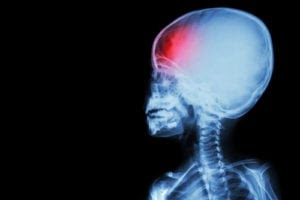
When someone gets into a car accident, there are a variety of injuries he or she can sustain. One of the most common types of injuries that result from car accidents are traumatic brain injuries. In fact, traumatic brain injuries so commonly result from car accidents, that over half of all reported brain injuries were caused by them. However, determining whether you have suffered a traumatic injury after a car accident can be hard to pinpoint. This is because symptoms of brain injury may not manifest until days or weeks after the accident occurs. Accordingly, it is important for anyone who has been involved in a car accident to understand the types of traumatic brain injuries one can sustain and the symptoms that may manifest if one experiences a traumatic brain injury.
Concussions
By far the most common traumatic brain injury car accident victims suffer is a concussion. Concussions range from very mild to quite severe. They are caused when the impact causes a person’s head to move back and forth very rapidly. When the head moves in this fashion, it causes the brain to also jolt back and forth or hit the skull. Concussions may cause temporary unconsciousness and impaired cognitive functioning.
Diffuse Axonal Injuries
Diffuse axonal is a traumatic brain injury that occurs when connecting fibers in the brain called axons are sheared. Similar to how concussions are caused, diffuse axonal injuries occur when sudden movements of the head cause the brain to bounce back and forth inside the skull rapidly. In a car accident, this may occur if a person’s head hits the side window, dashboard, windshield, or another object in the car at a high rate of speed. It may also occur if the car in which a person is traveling is hit more than once or if the call rolls, causing the person’s head to jerk repeatedly back and forth.
Coup-Contrecoup Injuries
Coup-contrecoup injuries are contusions, or bruises, on the brain. Coup injuries are bruises that form at the site of impact whereas contrecoup injuries are bruises that form on the opposite side of the site of impact. In a car accident, coup and contrecoup injuries occur when the person suffers an impact injury to the head and the brain hits against the skull.
Symptoms of Traumatic Brain Injuries
If car accident victims suffer traumatic brain injuries, they will likely exhibit one, some, or all of the following symptoms:
- Headaches
- Vomiting
- Memory loss
- Dizziness
- Loss of balance and difficulty walking
- Slurred speech
- Numbness in extremities
- Confusion or disorientation
- Sensitivity to light and/or sound
- Exhaustion
- Loss of alertness
- Dilated pupils
- Seizures
However, even if car accident victims do not experience any of the above symptoms, they may still be suffering from a traumatic brain injury. Accordingly, it is important that people who are involved in a car accident seek immediate medical attention. Seeking immediate medical attention will help to diagnose traumatic brain injury early and allow those who suffer them to determine if they need to obtain legal representation to get the monetary compensation they need to treat their newly acquired injury.
Contact a Fort Lauderdale Personal Injury Lawyer to Discuss Your Car Accident Case in Florida
Did you or a loved one sustain serious injuries due to a car accident in Florida? Don’t let the medical bills pile up while you wait for the negligent party or their insurance company to do the right thing. Right now, you need an aggressive personal injury attorney on your side, fighting to get you the compensation you need, want, and deserve. The skilled attorneys at Lawlor, White & Murphey represent clients injured because of car accidents in Fort Lauderdale, Venice, Naples, Pompano Beach, and throughout Florida. Call 954-525-2345 (South Florida) or (855) 347-5475 (Toll-Free) or email us to schedule a free consultation about your case. We have an office conveniently located at 2211 Davie Boulevard, Fort Lauderdale, FL 33312, as well as offices in Naples, Venice, Port St. Lucie, Pembroke Pines, Weston, Coconut Creek, Pompano Beach, and Plantation.
The articles on this blog are for informative purposes only and are no substitute for legal advice or an attorney-client relationship. If you are seeking legal advice, please contact our law firm directly.
